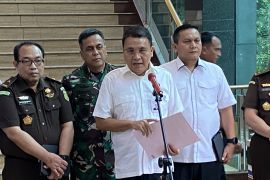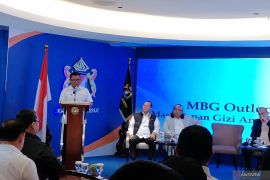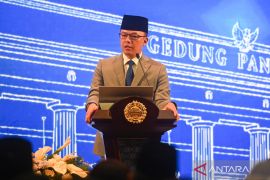Marty said that the government this year alone was able to protect over 15 thousands of its citizens facing threats in various parts of the world.Jakarta (ANTARA News) - Facing `hails of bullets` from its critics that it has failed to protect Indonesians abroad as showcased by the beheading of Ruyati in Saudi Arabia last weekend, the government on Thursday explained what it has done overseas.
"I am not seeking a justification but merely presenting the facts. In the past few days the government has been pictured as lagging behind other countries in protecting their workers. Indeed there are opportunities for improvement but the reality is often different," Foreign Minister Marty Natalegawa said.
He made the remarks when he explained the government`s measures to assist Indonesian nationals facing trouble in other countries and in response to criticism that Indonesia is even lagging behind the Philippines in protecting its nationals aboard.
The execution of the Indonesian domestic helper sparked an uproar at home and calls on the government to apologize to the people and to protect some 22 other Indonesian migrant workers who are now on death row in Saudi Arabia.
Criticisms among others came from observers, politicians and community leaders, including Iberamsjah, professor of political and social sciences of the University of Indonesia (UI), M Julian Manurung, chairman of the Indonesian Community I Forum (FKI-1) and Hasyim Muzadi former chairman of the Indonesian largest Muslim organization (NU).
They criticized the government for its failure to protect Ruyati, and urged it to account for the tragedy and apologize to the people.
Boni Hargens, a political scientist at the University of Indonesia, even suggested that an independent team should be set up to evaluate the performance of all Indonesian representatives abroad.
Marty said that the government this year alone was able to protect over 15 thousands of its citizens facing threats in various parts of the world.
In response to commentaries from observers that the Philippines is one of the countries that have made a success in workers` protection, the minister said quoting a case in 1999 that the Philippine representative in Saudi Arabia only knew that its citizens had been executed two weeks later.
According to an open source, he said, from 2001 to 2006 six Filipinos had been executed despite their government`s intervention. He said he quoted data on the Filipino workers from an open source because some observers and politicians in Indonesia have often mentioned that the Philippines have been able to prevent executing its citizens.
The Indonesian government in the last two years succeeded in preventing four of its citizens from execution in Saudi Arabia so that the number of those saved had reached nine.
"This is a fact that we have been successful in saving nine citizens, and even in the last two years we have freed four Indonesians from the death sentence," Marty said at the presidential office on Thursday.
He said in the span of 1999-2001, there were only two Indonesian nationals who were executed, the number of which was far smaller than those of the Filipinos executed in the 2001-2008 period which reached six.
As regards the Ruyati case, the minister said that the Indonesian Consulate General in Jidda had also sought clemency from the victim`s family and the governor of Mecca, though it was rejected after Ruyati confessed in the court that she had indeed killed her employer on January 12, 2010, a fact that must not be ignored.
While the request for a clemency was still ongoing on January 18, 2011 the Saudi authorities without prior information carried out the execution. And the Indonesian government has extended a strong protest to the Saudi government over the execution.
Apart from cases in Saudi Arabia, the government has also handled various cases in other parts of the world.
He said that the government had been working hard to secure, save and protect its citizens from the conflicts in the Middle East, in Egypt, Tunisia, Libya, Yemen, Bahrain, from the threat of hijackers in Somalia and the threat of nuclear radiation following the natural disasters in Japan.
"This is an example. We are not showing off our successes but pointing out the hard facts. Since the beginning of this year we have saved at least 15 thousand Indonesian nationals in various parts of the world, because it is our tasks and responsibility," the minister said.
He said that in 2010, a total of 15,766 Indonesians were given protection at Indonesian embassies in various countries. "A total of 15,766 citizens took refuge at various Indonesian embassies in 2010. You can check and compare it with other countries," the minister said.
After all, the government has also repatriated thousands of overstayers from Saudi Arabia. Until last March, 2,073 overstayers have been facilitated to return home, and early in May, the government repatriated another 2,349.
The government planned to help some 25,000 overstayers return home this year from Saudi Arabia where about 1.5 million Indonesian migrants are working.(*)
Reporter: By Andi Abdussalam
Editor: Heru Purwanto
Copyright © ANTARA 2011











